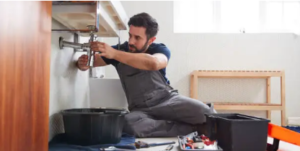Plumbing professionals are essential in homes and commercial properties as they install, maintain, and upgrade piping systems that supply water, manage waste, and provide heat. Skilled plumbers interpret blueprints and building regulations to complete projects that adhere to industry standards.
Distinct-Plumbing plumber Elizabeth requires physical stamina, adaptability, and strong problem-solving skills – discover more about this profession and how you can become one!
Job Duties
Plumbers specialise in installing, maintaining, and repairing sanitation units, water/gas supply lines and heating systems in homes, commercial properties, and industrial settings. Their duties involve reading blueprints to plan pipe installations; testing water pressure levels; locating leaks or blockages; fitting new parts like toilets or sinks; power flushing central heating systems, and repairing existing plumbing systems.
 Plumbers provide training and supervision of other plumbing workers and apprentices. In addition, they communicate with clients to assess their needs, explain the costs and procedures of completing repairs, build rapport with customers, and attend emergency calls at night or weekends – making flexibility the critical factor in this career choice.
Plumbers provide training and supervision of other plumbing workers and apprentices. In addition, they communicate with clients to assess their needs, explain the costs and procedures of completing repairs, build rapport with customers, and attend emergency calls at night or weekends – making flexibility the critical factor in this career choice.
Some plumbers specialise in specific areas, like sewage, drainage or gas systems. A commercial plumber, for instance, might work on larger scale installations in office blocks or retail stores to install plumbing for large spaces like office blocks or retail stores with waste removal systems that connect properly to local water and sewage lines – they may also carry out regular maintenance checks to make sure everything runs efficiently – their job also involves physical strength and agility as they must navigate tight spaces effectively.
Education and Training Requirements
Fixing leaky faucets or installing new toilets, sinks, bathtubs, water heaters, dishwashers, or food disposal units requires special qualifications for success in plumbing. Plumbers require a high school diploma or GED certificate and training from either a technical school or apprenticeship program – typically five-year programs that include classroom work (144 hours per year) and on-the-job experience (2000 hours annually).
Plumbing requires strong attention to detail and an ability to read blueprints and operate tools effectively, along with passing state or local licensing exams and having several years of work experience under the supervision of a master plumber. Some municipalities even mandate continuing education courses for plumbers to keep their licenses current.
Distinct-Plumbing plumber Elizabeth must respond quickly to unexpected situations in clients’ homes and navigate tight spaces to complete tasks, making the profession highly demanding yet rewarding. A plumber must also have physical stamina for heavy lifting and standing for long periods; working with raw sewage contains microbes that may cause infections like cholera, typhoid and hepatitis; they may also risk exposure to fecal matter and vomit while plumbing. To minimise risks when working in sewer systems, plumbers must wear protective clothing and follow safety protocols while performing their duties.
Working Conditions
Plumbers in Elizabeth typically work in diverse environments and conditions. Their profession requires hands-on, problem-solving work that can be engaging and satisfying, with good wages depending on experience and skill sets. Furthermore, plumbers have the option of either working independently or founding their plumbing businesses to increase further scheduling flexibility and earnings potential.
Work conditions for plumbers can sometimes be dangerous, particularly when handling human waste and other potentially contaminated materials. Plumbers must always remain calm under pressure; otherwise, they could experience health hazards, including breathing in chemicals. Therefore, they must wear appropriate protective equipment, including masks, goggles, earplugs and gloves and take thorough showers after exposure to potentially contaminated substances.
Working long, difficult hours is one of the greatest challenges of being a plumber. Since most plumbing issues require immediate attention to prevent further damage and risks to human health, plumbers may often work late into the night or on weekends to address such emergencies quickly – resulting in increased levels of stress and burnout; but, regardless of these obstacles, seeing immediate results of fixing an issue can be very satisfying.
Salary
Plumbers are in great demand due to the frequent need to repair and install water and drainage systems in homes, commercial properties and industrial settings. In addition, these professionals often perform repairs on appliances like toilets, faucets and sinks which also need fixing.
Plumbers are independent of economic fluctuations, so their income remains consistent year-round. Furthermore, their schedule can often be flexible during busy periods – constantly working overtime – and being available 24/7 for emergency jobs on weekends and bank holidays.